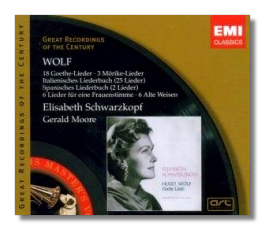
The Internet's Premier Classical Music Source
Related Links
- Wolf Reviews
- Latest Reviews
- More Reviews
-
By Composer
-
Collections
DVD & Blu-ray
Books
Concert Reviews
Articles/Interviews
Software
Audio
Search Amazon
Recommended Links
Site News
 CD Review
CD Review
Hugo Wolf
Lieder

- Goethe-Lieder (18)
- Sechs Lieder für eine Frauenstimme
- Eichendorff-Lieder: Die Zigeunerin
- Mörike-Lieder (3)
- Spanisches Liederbuch (2)
- Sechs alte Weisen
- Italienisches Liederbuch (25)
- Vier Gedichte nach Heine, Shakespeare, und Lord Byron: Sonne der Schlummerlosen
Elisabeth Schwarzkopf, soprano
Gerald Moore, piano
EMI Classics 380029-2 ADD 2CDs: 70:28, 72:35

- Goethe-Lieder (18)
- Sechs Lieder für eine Frauenstimme
- Eichendorff-Lieder: Die Zigeunerin
- Mörike-Lieder (3)
- Spanisches Liederbuch (2)
- Sechs alte Weisen
- Italienisches Liederbuch (25)
- Vier Gedichte nach Heine, Shakespeare, und Lord Byron: Sonne der Schlummerlosen
Gerald Moore, piano
EMI Classics 380029-2 ADD 2CDs: 70:28, 72:35
How times have changed. The inside front cover of EMI's booklet reproduces a recording session photo from 1961 of Schwarzkopf and Moore, together with recording producer (and Schwarzkopf's husband) Walter Legge. Both Moore and Legge are smoking away – don't they know about the dangers of second-hand smoke? Schwarzkopf looks concerned, but perhaps not about the smoking or the smoke.
Schwarzkopf introduced many listeners to the songs of Hugo Wolf. This is a rather elusive genre. One can call these works songs or Lieder, but perhaps it is more accurate to call them sung stories, or poems with music. There are melodies, of course, but not as in Schubert, for example, where it often is possible to transcribe his songs successfully for an instrument. A Wolf song played on a piano or by a violin would be boring. Words and vocal interpretation are of paramount importance, and the pianist doesn't accompany the singer as much as he complements and comments upon what he or she is singing.
In everything that she performed, Schwarzkopf knew how to get audiences to listen to words as well as to notes. Every phrase had a meaning. For some listeners, Schwarzkopf overdid it; they felt that she was hitting them over the head with interpretation, as if they were too dumb to figure out what the music was about on their own. Both fans and detractors will find plenty of ammunition in Schwarzkopf's Wolf. Playing this pair of discs is like being around Lon Chaney's man of a thousand faces, or like hearing Al Jolson brag, "You ain't heard nothin' yet!" Take, for example, "Mausfallensprüchlein," one of Wolf's most popular songs. This is a "spell for a mousetrap," and Schwarzkopf performs it as if she were entertaining kindergartners, with funny voices, and much vocal winking and mugging. It's adorable or it's arch: you decide. Schwarzkopf leaves little to the listener's imagination.
Nevertheless, if one wants a lesson in how to act with the voice, Schwarzkopf is a teacher with seemingly infinite resources. And then there's that voice: cool and silvery, like an Alpine brook. At times there is so little vibrato that the voice seems to turn as smooth and white as a sheet of paper – a perfect surface on which to write. Then, when she increases the vibrato, it is like being on the sea, with the waves pushing the boat forward as it sails towards port.
Calling Gerald Moore an accompanist is like calling a Maserati a car. No less expert than Schwarzkopf, he is her equal in telling Wolf's little stories, whether they are about lovesick girls, elves, or coy shepherdesses. He finds as much expression in little things as she does. No wonder she performed and made so many recordings with him.
These recordings come from 1956-59, 1961-62, and 1965. In the later recordings, Schwarzkopf's voice becomes warmer (or is it the recording process itself?) but there is no diminution in vocal resources. The interpretations also are less exaggerated, although one could argue that the repertoire chosen for the later recordings was less likely to bring out the "cutes" in the soprano.
Happily, the booklet contains German texts and English translations. There is no point listening to vocal music without understanding what is being sung, but that is particularly true for Hugo Wolf's music. These are tough times for the classical music recording industry, I know, and I am grateful that EMI did not take the easy way out, even though this release is part of its mid-price "Great Recordings of the Century" series.
Copyright © 2007, Raymond Tuttle




















